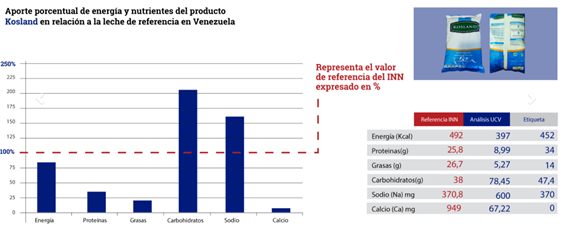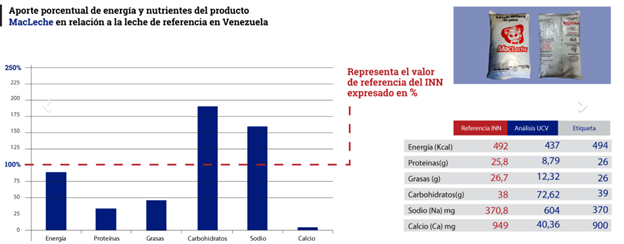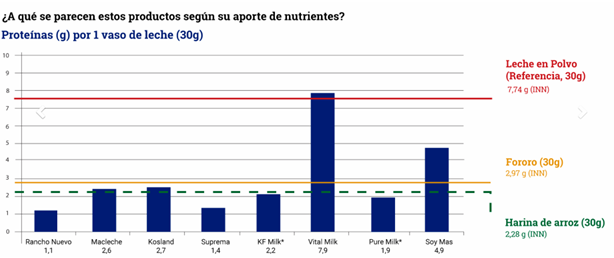No Use Crying Over Spilled Malk: It’s Not Milk
Just another item on chavismo's cruel procedure list: the irresponsible distribution of products that satiate hunger, but are far from being nutritious.


It’s not actually milk. Heck, it doesn’t even have what its own nutrition label says it has.
Long gone are the days when children could count on a glass of milk at school. Today, pretty much everyone is poor and since money is not enough for food, they don’t give you milk: they give you malk.
Mothers feed their children with this stuff and hope for the best. It’s impossible to know what their kids are eating. But the government knows. They know people are hungry, they know people are poor, they know they are dependant on this handouts and yet, the fact that they distribute such low quality products and disguise them means they are OK playing with people’s hunger.
In a country where folks go to sleep hungry and 87% of the population is poor, government subsidized food is key to survive. That 87% sounds like a lot of people are getting fed, we just don’t know what, exactly.
A chemical and nutritional analysis carried by UCV’s Foods Science and Technology Institute published by Armando.Info shows how the stuff the government distributes to households as part of its CLAPs system doesn’t meet the requirements set by Venezuela’s National Nutrition Institute (INN).
That means the “malk” is a placebo. It’ll make hunger go away, but only in your head. Your body still needs the nutrients.
Here’s the Kosland brand, for instance:
100gr of Kosland reconstituted powdered malk only has 8,9 gr of protein (that’s 34% of what it should have). Since the fat content is also lower than it should, what they did to increase the calorie count is add more carbs. This (and the 600mg of sodium) is probably why people complain of malk causing diarrhea.
While it would take 1,8 glasses of milk to cover your daily calcium nutritional needs, you’d need 24,8 glasses of Kosland to fulfill the 500mg of calcium a day recommendation.
Armando.Info got their hands on another seven brands of CLAP’s Mexican malk (Rancho Nuevo, Suprema, KF Milk, Vital Milk, Soy Mas, Mac Leche and Pure Milk), all of which fail to meet the INN’s standards, displaying fictional nutritional info on the packaging.
The Mac Leche brand is infamous for its salty flavor; that’s 604 mg of sodium for you.
It would take children 41,3 glasses of Mac Leche a day to meet the recommended daily calcium intake.
Social media has been very vocal about this: people complain malk won’t cream their coffee, or that it settles at the bottom of the jar. It tastes ugly and it gives kids diarrhea or stomach ache.
Now, thanks to Armando.Info and UCV’s analysis, we know that drinking malk can actually be harmful.
But if malk is not milk, what is it?
If you look at the protein composition, most of these brands resemble rice flour or plantain flour (fororo). That’s because the calorie intake is justified by a high carb content. Only one of the eight brands presents a protein composition that’s near the desired number.
Bottom line: people are not getting the nutrients they need.
So why are these products brought from Mexico?
According to Armando.Info, the Venezuelan government places the orders of purchase through the intermediary companies it has links with, through figureheads like Samark López or Alex Saab.
Apparently, Mexico has a long tradition of fraudulent milk production and distribution for social programs. While Mac Leche’s producer, DAI (Industrial Dehydrated Foods), works in both Venezuelan and Mexican markets, the rest of the brands in this report are produced by ghost companies.
Social media has been very vocal about this: people complain malk won’t cream their coffee, or that it settles at the bottom of the jar.
Malk not only contravenes Venezuelan INN’s standards, it also contravenes Mexico’s own regulations on calorie content and food labeling. Some of this malk will skip Venezuelan regulations by branding themselves as “Dairy Beverage”, for which INN’s has no standards, and apart from Mac Leche, most of the other malks are not found in the Mexican market.
Armando.Info tried to track down Brandon Group, responsible for the production of Suprema and Lacto Mas. The address in the packaging led to a house in Nuevo León, where another company (allegedly unrelated to malk) operates. Similarly, when Dilac’s address (responsible for KF Milk and Pure Milk) was tracked down, it turns out that while a dairy company called Dilac was actually there, it claimed it has nothing to do with malk or its distribution into the Venezuelan market.
The cruel part is, parents believe they are doing right by their kids by taking these CLAP products for their consumption. The next time you see a baby drinking milk, ask yourself, is that milk or a placebo? What’s the actual nutritional value? Why the hell is chavismo doing this?
Caracas Chronicles is 100% reader-supported.
We’ve been able to hang on for 22 years in one of the craziest media landscapes in the world. We’ve seen different media outlets in Venezuela (and abroad) closing shop, something we’re looking to avoid at all costs. Your collaboration goes a long way in helping us weather the storm.
Donate







